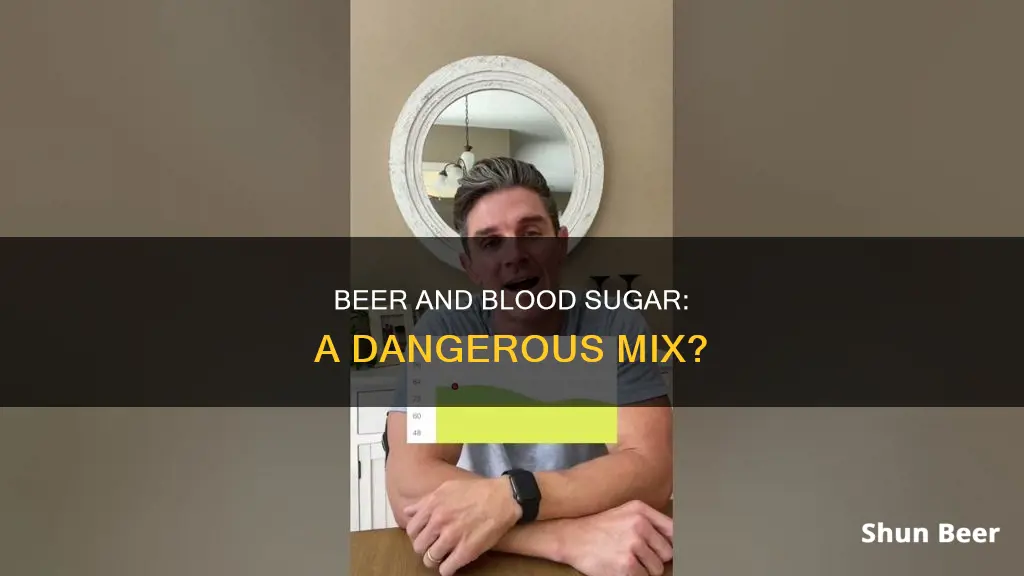
Alcohol can have a significant impact on blood sugar levels, and this is a particular concern for people with diabetes. Beer, like other alcoholic drinks, can cause both increases and decreases in blood glucose levels. Beer contains carbohydrates, which are absorbed into the bloodstream relatively quickly, leading to increased glucose levels. On the other hand, drinking a lot of beer can lead to hypoglycaemia, or low blood glucose levels, especially for those with type 1 or type 2 diabetes using insulin. Alcohol also stimulates the appetite, so drinking beer with a meal may lead to overeating and further increases in blood glucose.
| Characteristics | Values |
|---|---|
| Effect on blood sugar | Beer can increase blood sugar levels as it contains carbohydrates that get absorbed into the bloodstream quickly. However, drinking a lot of beer can also reduce blood sugar levels. |
| Effect on appetite | Alcohol stimulates the appetite, which may lead to overeating and weight gain. |
| Effect on medication | Alcohol can interfere with diabetes medications, reducing their effectiveness. |
| Effect on weight | Alcoholic drinks are high in calories, which can lead to weight gain. |
| Effect on liver | Alcohol interferes with the liver's ability to regulate blood sugar levels. |
| Effect on hormones | Alcohol affects the hormones that regulate blood sugar levels. |
| Effect on insulin | Alcohol can decrease insulin sensitivity, impacting the body's ability to regulate blood sugar. |
| Effect on health complications | Alcohol can worsen certain diabetes complications, such as nerve damage, eye damage, and kidney disease risk. |
| Effect on heart health | Excessive alcohol consumption can negatively impact heart health, leading to increased blood pressure and heart complications. |
| Effect on brain | Low blood sugar levels due to alcohol consumption can affect mood and cause symptoms such as headaches, dizziness, and poor coordination. |
| Effect on gut | Alcohol can cause gut inflammation and disrupt the gut microbiota, affecting the immune response and glycemic control mechanisms. |
What You'll Learn
- Beer contains carbohydrates, which can increase blood glucose levels
- Drinking beer can reduce blood glucose levels, leading to hypoglycaemia
- Alcohol interferes with blood sugar regulation by disrupting hormones
- Beer stimulates the appetite, which may lead to overeating and weight gain
- Alcohol can affect the effectiveness of diabetes medications

Beer contains carbohydrates, which can increase blood glucose levels
Beer and other alcoholic drinks can contain a lot of calories, which can lead to weight gain and make it harder to manage diabetes. Calories from alcohol are stored in the liver as fat, and liver fat makes liver cells more insulin-resistant, which can make your blood sugar levels higher over time. Alcoholic drinks such as beer and sweetened mixed drinks are high in carbohydrates, which can raise blood sugar levels.
The number of carbohydrates in beer varies depending on the type of beer. For example, a 12-ounce bottled beer typically has around four to five per cent alcohol by volume (ABV), while a craft beer can have as much as 10 per cent ABV. Craft beers usually have more calories and are generally higher in carbohydrate content than bottled beers.
The effects of beer on blood sugar levels can be seen up to 12 hours after consuming your last drink. It is recommended that people with diabetes who plan on drinking alcohol should check their blood sugar levels before and up to 24 hours after drinking. They should also check these levels at bedtime to ensure they are stable before sleeping.
It is important to note that drinking alcohol can also affect people with diabetes in several other ways. Alcohol can stimulate the appetite, so you may unknowingly overeat when drinking with a meal, which will increase blood glucose levels and contribute to weight gain. Alcohol can also affect the liver's ability to regulate blood sugar and may interfere with certain diabetes medications.
Beer Sugar Content: Is It Really That High?
You may want to see also

Drinking beer can reduce blood glucose levels, leading to hypoglycaemia
The risk of hypoglycaemia is even higher when drinking on an empty stomach, as the liver's job of releasing glucose into the blood is impaired. Alcohol also stimulates the appetite, so drinking beer with a meal may lead to overeating, which can further impact blood glucose levels.
Additionally, alcohol interferes with the hormones needed to maintain healthy blood sugar levels. Alcohol consumption can affect the hormones that regulate blood sugar levels, disrupting glucose production in the liver and contributing to low blood sugar. It can also decrease insulin sensitivity, impacting the body's ability to regulate blood sugar effectively.
The risk of hypoglycaemia is also influenced by the amount of alcohol consumed. The more alcohol a person drinks, the higher the risk of experiencing low blood sugar levels. This is because the liver takes about 1 to 1.5 hours to process each alcoholic drink, and during that time, the person may be at risk of low blood sugar. The risk multiplies with each additional drink.
It is important to note that drinking beer is not the only factor that can lower blood glucose levels. Other factors include not eating enough carbohydrates, taking more insulin than needed, and being at a high altitude. Additionally, certain medications may not work if consumed with alcohol, and alcohol can also make it difficult for people with diabetes to lose weight due to its calorie content.
Therefore, it is recommended that people with diabetes who plan on drinking alcohol check their blood sugar levels before and up to 24 hours after drinking. They should also check these levels at bedtime to ensure they are stable before sleeping. It is also suggested that they eat a carbohydrate-rich meal or snack while drinking to help maintain blood sugar levels.
Beer's Sweet Secret: Sugar Content Explored
You may want to see also

Alcohol interferes with blood sugar regulation by disrupting hormones
Alcohol interferes with the body's ability to regulate blood sugar by disrupting hormones. The liver is responsible for releasing glucose into the bloodstream to maintain normal blood sugar levels. However, when you consume alcohol, the liver prioritises breaking it down over releasing glucose, leading to a drop in blood sugar levels. This effect can last for hours after drinking and is more pronounced with higher alcohol consumption.
According to the NIH, alcohol consumption can affect the hormones that regulate blood sugar levels. Alcohol disrupts the normal functioning of the hormone system, which can have serious medical consequences. It interferes with the glands that release hormones and the tissues targeted by those hormones. This disruption can impact several major bodily functions, including growth and development, blood pressure maintenance, and energy production and storage.
Additionally, alcohol can augment insulin secretion, causing temporary hypoglycaemia, and inhibit glucose production while it is being metabolised. Heavy alcohol consumption can also impair the hormonal response to hypoglycaemia and decrease insulin sensitivity. Furthermore, it can limit glucose intake by reducing appetite and disrupting normal eating patterns.
Chronic heavy drinking is associated with glucose intolerance and can alter the effectiveness of diabetes medications. It can cause both hypoglycaemic and hyperglycaemic episodes and increase the risk of diabetes-related complications. Alcohol consumption can also impact the pancreas, which plays a crucial role in blood sugar regulation by producing insulin and glucagon. Alcohol can cause inflammation of the pancreas, disrupting insulin production and leading to pancreatitis.
In summary, alcohol interferes with blood sugar regulation by disrupting the normal functioning of the hormone system and impacting the organs and processes involved in maintaining stable blood sugar levels. These disruptions can have significant effects on overall health and increase the risk of diabetes-related complications.
Sugar in Beer: How Many Grams?
You may want to see also

Beer stimulates the appetite, which may lead to overeating and weight gain
Beer and other alcoholic drinks can cause a person to overeat and gain weight. Alcohol stimulates the appetite, which may lead to overeating and weight gain. Firstly, alcohol is calorie-dense, with 7 calories per gram, which is more than the number of calories per gram of protein or carbohydrates. Secondly, alcohol suppresses the oxidation of fatty acids, which contributes to feelings of hunger as fatty acids play a role in appetite regulation. Thirdly, alcohol increases thermogenesis (calorie utilisation causing heat production) in the short term, which means a person may feel hungry again faster than usual.
There are also several physiological reasons why a person might feel hungrier after drinking alcohol. Alcohol stimulates or inhibits neurochemical systems that play a role in appetite regulation. While the exact process is still unclear, researchers have noted that alcohol affects two primary hunger-regulating hormones: Leptin and GLP-1. These hormones suppress appetite and are inhibited when alcohol enters the body. As a result, a person starts feeling hungry after a few drinks, even if they are actually “full”. Alcohol also stimulates the same neurons in the brain that are triggered when the body goes into starvation mode. This stimulation could even lead to ethanol-induced overeating.
Alcohol also lowers inhibitions and decreases defences when it comes to portion control and making healthy eating choices. With a drink in hand, a person is more likely to grab handfuls of nuts, chips, bread, or whatever food is available without really giving it a second thought. Alcohol can also lower blood sugar, which can cause cravings for sugar and carbs. Drinking alcohol can impair the liver’s ability to release the right amount of glycogen, or stored glucose, into the blood to keep blood glucose levels stable. People with diabetes are at even higher risk for low blood sugar levels when they drink, especially when consuming alcohol on an empty stomach.
Beer and Sugar: What's the Connection?
You may want to see also

Alcohol can affect the effectiveness of diabetes medications
Additionally, alcohol can interfere with the effects of diabetes medications, increasing the risk of hypoglycemia or hyperglycemia, depending on how much you drink and what medication you take. For example, combining alcohol with certain diabetes pills, such as sulfonylureas and meglitinides, which stimulate the pancreas to produce more insulin, can lead to a dangerous drop in blood sugar levels.
Furthermore, alcohol can affect your liver's ability to regulate blood sugar. It can prevent your liver from converting proteins and fats into carbohydrates when your body needs energy, such as during exercise or between meals. This can be particularly dangerous for people with diabetes, as their bodies already struggle to regulate blood glucose levels.
Therefore, it is crucial for people with diabetes to be cautious when consuming alcohol and to consult their doctor or healthcare provider to understand how alcohol may impact their condition and medication.
Beer's Sugar Impact: What Happens in the Body?
You may want to see also
Frequently asked questions
Beer can increase blood sugar levels as it contains carbohydrates, which are absorbed into the bloodstream relatively quickly. However, drinking a lot of beer can also reduce blood sugar levels, leading to hypoglycaemia.
If you have diabetes, drinking beer can cause your blood sugar to drop very low, increase your appetite, and reduce your medication's effectiveness. It can also affect your body's ability to regulate blood sugar.
Symptoms of low blood sugar include headaches, irregular heartbeat, anxiety, confusion, and seizures.
Here are some tips to help you drink beer without spiking your blood sugar:
- Never drink on an empty stomach.
- Avoid mixed drinks with sugary mixers, juice, or soda.
- Drink in moderation.
- Don't drink immediately after exercising.
- Always eat before drinking an alcoholic beverage.







